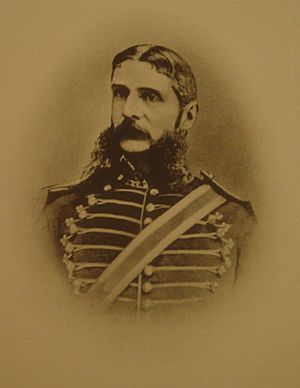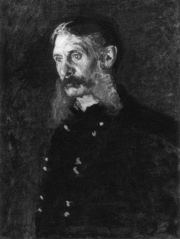Edward Burd Grubb Jr. facts for kids
Quick facts for kids
Edward Burd Grubb Jr.
|
|
|---|---|
 |
|
| Born | November 13, 1841 Burlington, New Jersey |
| Died | July 7, 1913 (aged 71) Newark, New Jersey |
| Place of burial |
Saint Mary's Episcopal Churchyard, Burlington, New Jersey
|
| Allegiance | United States of America Union |
| Service/ |
United States Army Union Army |
| Rank | |
| Battles/wars | American Civil War |
Edward Burd Grubb Jr. (born November 13, 1841 – died July 7, 1913) was an important figure in American history. He was a colonel in the Union Army during the American Civil War. He led different groups of soldiers. After the war, he became a brevet brigadier general. This was a special honor for his brave service. Later, he was chosen by President Benjamin Harrison to be the United States Ambassador to Spain. He was also a successful businessman and a politician in New Jersey. He was good friends with Woodrow Wilson, who later became president.
Life Story
Edward Burd Grubb Jr. was born in Burlington, New Jersey. His family had been involved in the iron business for many generations. They were known as the Grubb Family Iron Dynasty. Edward went to Burlington College and finished school in 1860. This was just a few months before Abraham Lincoln became president.
Serving in the War
In May 1861, Edward joined the army. He became a first lieutenant in the 3rd New Jersey Volunteer Infantry. He was later promoted to Captain. He worked for General George W. Taylor during the 1862 Peninsula Campaign. During this time, he got sick and had to go to a hospital ship.
In November 1862, Edward became a Major. He moved to the 23rd New Jersey Volunteer Infantry. This group was made up of men from his hometown. In March 1863, he became a Colonel and leader of this group. His regiment was nicknamed "The Yahoos." They fought bravely at the Battle of Salem Church during the Battle of Chancellorsville. Edward was hurt in this battle. His group's time in the army ended in June 1863.
After a year of helping new soldiers, Edward became a colonel again. He led the 37th New Jersey Infantry. This group served in the trenches at Petersburg, Virginia. They also did guard duty. One night, they were attacked and had few weapons. This led to their nickname, "Grubb's Game Chickens." Edward's younger brother, Parker Grubb, was also in this group. Sadly, he died from an illness.
For his brave service, President Andrew Johnson honored Edward. In 1866, he was named a brevet brigadier general. This was for his "gallant and meritorious services during the war."
After the War
After the war, Grubb went back to Burlington. He became a successful iron manufacturer. He took over his family's business. He was the president of the Lebanon Valley Furnace Company for many years. In 1868, he married Elizabeth Wadsworth Van Rensselaer. They had one daughter together.
Edward also served on the Burlington City Council. He was its president for two years. He and his wife traveled a lot in Europe. He even wrote an article about the Suez Canal in 1869. This was the first article about it published in the United States. In 1872, he had a famous architect design a house for him. It is still called "Grubb Cottage." He also built a large estate called "Grassmere." Here, he would host yearly parties for the soldiers from his old regiment.
In 1874, Grubb joined the First Troop Philadelphia City Cavalry. This was a special group that had once protected George Washington. He became the Captain of this Troop for 14 years. He also became a colonel in the New Jersey National Guard. He helped lead the New Jersey regiment at the 1881 celebration of the Siege of Yorktown. His group won an award for being the best drilled. He stayed active with veteran groups and hosted reunions for his soldiers.
Edward's wife died in 1886.
Political Life

In 1889, Edward Grubb ran for governor of New Jersey. He was a war hero, and the Republicans hoped he could win. He spoke to the public and called for changes to voting rules. He wanted to stop political groups from controlling elections. The election was very close. There were problems with how votes were counted in some areas. Many election workers were found guilty of fraud. Even though there were issues, his opponent was declared the winner.
That same year, Benjamin Harrison became president. President Harrison chose Grubb to be on a special board for West Point Military Academy. Grubb was elected vice president of this board. Later, Grubb was appointed as the United States Ambassador to Spain. While in Spain, he worked on a trade agreement. He resigned in 1892 and returned to New Jersey.
Grubb continued to be involved in politics. He left the Republican Party to support reforms. He actively helped Woodrow Wilson when Wilson ran for governor of New Jersey. Wilson and Grubb became close friends. Governor Wilson often stayed at Grubb's home.
Later Years
While in Spain, Grubb met Violet Sopwith. She was the daughter of an English engineer. Violet's younger brother, Thomas Sopwith, later became famous for aviation. Edward and Violet married and had three children.
Grubb was very interested in his family's history. He even met with a distant cousin who was the family historian. In 1908-1909, he made national news. He hosted a reunion at his "Grassmere" estate. Soldiers from his old regiment, "The Yahoos," met with soldiers from a Confederate regiment they had once fought. They met as friends.
In 1911, Grubb faced financial difficulties. Governor Wilson then appointed him as the Superintendent of the New Jersey Home for Disabled Soldiers. Edward Burd Grubb Jr. died in Newark, New Jersey. He was buried in Saint Mary's Episcopal Churchyard in Burlington.
 | Toni Morrison |
 | Barack Obama |
 | Martin Luther King Jr. |
 | Ralph Bunche |

